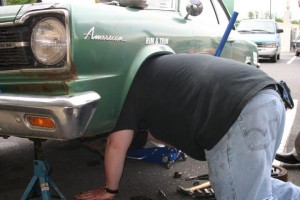 What are the signs you should have your brakes inspected? Some newer cars have sensors on the pads, but for the for the majority of vehicles on the road you must look, listen and feel. Never take a chance that a symptom of brake trouble will go away like a pimple or rash. Brake problems can kill faster than cancer.
What are the signs you should have your brakes inspected? Some newer cars have sensors on the pads, but for the for the majority of vehicles on the road you must look, listen and feel. Never take a chance that a symptom of brake trouble will go away like a pimple or rash. Brake problems can kill faster than cancer.
There are two ways to check for brake wear on your brakes, by looking and by listening. Check for wear by looking at your brake pads through the spaces between the wheel’s spokes. The outside pad will be pressed against a metal rotor. Generally, there should be at least 4mm of pad. If you see less than 4mm of pad, you need to to have your brake pads inspected or replaced. But you still need to remove the wheel to check of inner pad wear.
Have you ever heard a high-pitched screeching sound when you applied your brakes? That’s a small metal finger, called an indicator, which is giving you an audible warning that you need to replace your brake pads. You should be aware of this sound (which is loud enough to be heard while the windows are up, but not necessarily loud enough to be heard over the radio or air conditioner). If you hear it, quickly make an appointment with your mechanic. If it stops making the noise, you are in more trouble.
How the brake pedal feels is a good indication of the health of the brake system. Any changes in feel, travel or level indicates there is a problem with the brakes. If your brakes are not as responsive as they should be or if the pedal “sinks” toward the floor, this could be an indication of a leak in the braking system. It could be an air leak (in the brake hose) or a brake fluid leak. One telltale sign of a brake fluid leak is the presence of a small puddle of fluid when the car is parked. Brake fluid looks similar to fresh motor oil, but with a less “slimy” texture. Also, adding brake is not normal.
If your vehicle “pulls” to one side while braking, it may be a sign that the brake linings are wearing unevenly or that there is foreign matter in the brake fluid. Your vehicle may need a brake adjustment or to have the fluid drained and replaced.
Grinding or growling.This loud metallic sound means that you have worn down the pads completely, most likely beyond replacement. The grinding or growling noise is caused by the two pieces of metal (the disc and the caliper) rubbing together. This can “score,” or scratch your rotors, creating an uneven surface.
Periodic inspection is the OE recommended way to spot brake wear before it becomes a problem. Brakes should be inspected every 5,000 to 7,000 miles. Never take a chance that a problem could be a glitch that will go away!